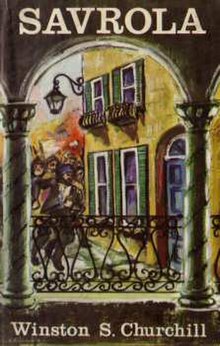Savrola

Chivers 1973 edition
|
|
| Author | Winston Churchill |
|---|---|
| Country | UK |
| Genre | Fiction |
| Publisher | Longman, Green and Co. |
|
Publication date
|
1900 |
| Media type | |
| Pages | 345 (1st edition) |
| OCLC | 4900630 |
Savrola: A Tale of the Revolution in Laurania is the only major fictional work of Sir Winston S. Churchill. The story describes events in the capital of Laurania, a fictional European state, as unrest against the dictatorial government of president Antonia Molara turns to violent revolution.
Churchill began writing the novel on his voyage from Britain to India to take part in the Malakand campaign in August 1897. Churchill was on leave from his posting with the army in India when he had news of fighting in Malakand, and immediately arranged to return. The book was started before, and completed after, writing The Story of the Malakand Field Force about his experiences there. He wrote to his brother in May 1898 that the book had been completed. The working title for the book was Affairs of State. It was initially published as a serialisation in Macmillan's Magazine between May and December 1898, and was then published as a book in February 1900.
Savrola is in many respects a conventional example of the "Ruritanian" genre, being published just four years after the classic The Prisoner of Zenda, by Anthony Hope. The politics and institutions of Laurania reflect the values of England as Churchill experienced them. A comparison has been drawn between Molara and Oliver Cromwell, against whom an ancestor of Churchill's, also named Winston Churchill, fought as a captain of horse, something which would have been familiar to Churchill as part of his family history. The capital and its institutions are a miniature of London, so the State ball follows the etiquette of the great society gatherings in London which Churchill would have attended.
The heroine of the story, Lucile, is believed to have been modelled upon Churchill's mother, Lady Randolph Churchill. Lucile is the wife of the out-of-touch ruler of Laurania, Molara. Lucile abandons Molara for the charms of Savrola, a character more like Churchill himself. One of the characters, Tiro, an officer in the republican guard, discusses his life in conversation with Savrola, mirroring the life of a subaltern officer in the Indian Army which Churchill had experienced. Savrola himself is described as "vehement, high and daring", and the sort of man who could "know rest only in action, contentment only in danger, and in confusion find their only peace... Ambition was the motive force, and he was powerless to resist it". The story contains a nurse, who again has been compared to Churchill's own nurse, Mrs Everest. The book is dedicated to the officers of the 4th Hussars, Churchill's regiment.
...
Wikipedia
